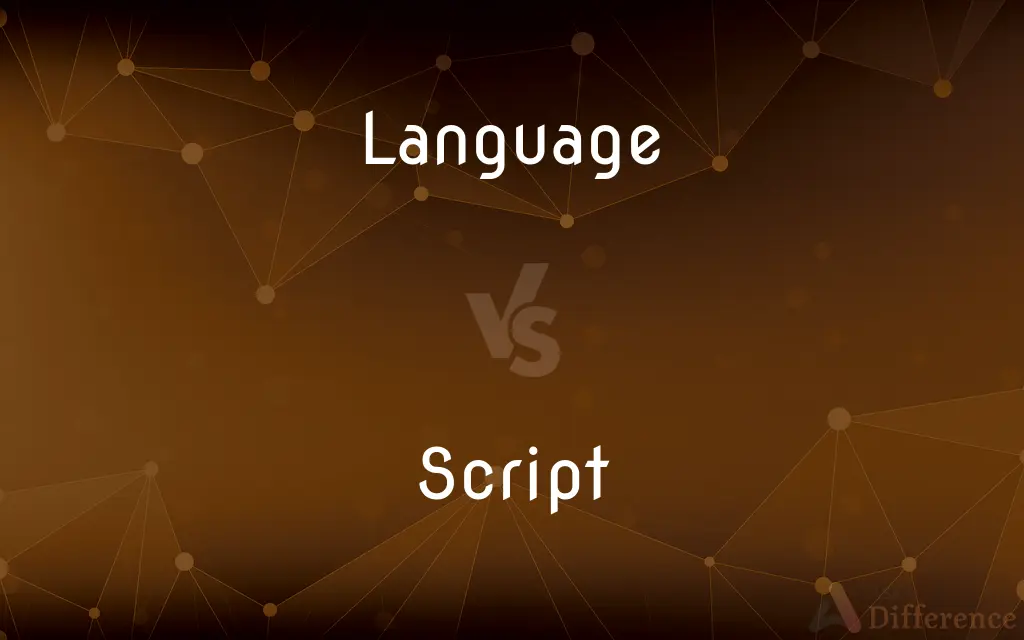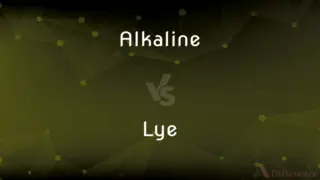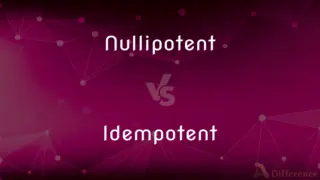Language vs. Script — What's the Difference?
By Tayyaba Rehman — Updated on October 12, 2023
Language is a system of communication using sounds or symbols. Script is a written representation of the sounds in a language.

Difference Between Language and Script
Table of Contents
ADVERTISEMENT
Key Differences
Language is a structured system of communication that can be spoken, written, or signed. Script, however, refers specifically to the set of characters or symbols used to write down a language.
Language embodies the grammar, vocabulary, and semantics that allow individuals to convey thoughts and ideas. Script serves as the graphical representation, a visual medium through which language can be read and understood.
The distinction between Language and Script is akin to the difference between speaking and writing. For instance, while English is a Language, it is written using the Latin script. Multiple languages can use the same script.
For example, Hindi and Sanskrit both employ the Devanagari script, even though they are distinct languages. Therefore, while Language is the medium of thought and communication, Script is a tool that represents that medium in written form.
Comparison Chart
Definition
System of communication
Set of characters for writing
ADVERTISEMENT
Medium
Can be spoken, written, or signed
Strictly written
Components
Grammar, vocabulary, semantics
Characters or symbols
Examples
English, Spanish, Mandarin
Latin, Cyrillic, Devanagari
Usability
Used for speaking and understanding
Used for reading and writing
Compare with Definitions
Language
A system used by humans to interact and share ideas.
Learning a new Language opens up new cultural doors.
Script
The written form of a spoken language.
The Latin Script is employed by several modern languages.
Language
The spoken or written method of human expression.
Poetry is a celebration of the intricacies of Language.
Script
A system of characters used to write a language.
The Cyrillic Script is used for many Slavic languages.
Language
A language is a structured system of communication used by humans, based on speech and gesture (spoken language), sign, or often writing. The structure of language is its grammar and the free components are its vocabulary.
Script
A set of symbols representing sounds or ideas.
Ancient Egyptians used the hieroglyphic Script.
Language
Communication of thoughts and feelings through a system of arbitrary signals, such as voice sounds, gestures, or written symbols.
Script
The graphical representation of linguistic sounds.
The Devanagari Script is used to write Hindi and Sanskrit.
Language
Such a system including its rules for combining its components, such as words.
Script
Handwriting.
Language
Such a system as used by a nation, people, or other distinct community; often contrasted with dialect.
Script
A style of writing with cursive characters.
Language
A system of signs, symbols, gestures, or rules used in communicating
The language of algebra.
Script
A particular system of writing
Cuneiform script.
Language
(Computers) A system of symbols and rules used for communication with or between computers.
Script
A style of type that imitates handwriting.
Language
Body language; kinesics.
Script
The matter set in this type.
Language
The special vocabulary and usages of a scientific, professional, or other group
"his total mastery of screen language—camera placement, editing—and his handling of actors" (Jack Kroll).
Script
The text of a play, broadcast, or movie.
Language
A characteristic style of speech or writing
Shakespearean language.
Script
A copy of a text used by a director or performer.
Language
A particular manner of expression
Profane language.
Persuasive language.
Script
(Law) The original of a legal instrument, as opposed to a copy.
Language
The manner or means of communication between living creatures other than humans
The language of dolphins.
Script
(Computers) A simple program in a language that the computer must convert to machine language each time the program is run.
Language
Verbal communication as a subject of study.
Script
To prepare (a text) for filming or broadcasting.
Language
The wording of a legal document or statute as distinct from the spirit.
Script
To arrange, direct, or control (an event or a person) as if supplying a script
"the brilliant, charming, judicial moderate scripted by his White House fans" (Ellen Goodman).
Language
(countable) A body of words, and set of methods of combining them (called a grammar), understood by a community and used as a form of communication.
The English language and the German language are related.
Deaf and mute people communicate using languages like ASL.
Script
(Computers) To write (code) for a program.
Language
(uncountable) The ability to communicate using words.
The gift of language
Script
A writing; a written document.
Language
(uncountable) A sublanguage: the slang of a particular community or jargon of a particular specialist field.
Legal language;
The language of chemistry
Script
Written characters; style of writing.
Language
The expression of thought (the communication of meaning) in a specified way; that which communicates something, as language does.
Body language;
The language of the eyes
Script
(typography) Type made in imitation of handwriting.
Language
A body of sounds, signs and/or signals by which animals communicate, and by which plants are sometimes also thought to communicate.
Script
An original instrument or document.
Language
A computer language; a machine language.
Script
(countable) The written document containing the dialogue and action for a drama; the text of a stage play, movie, or other performance. Especially, the final form used for the performance itself.
Language
(uncountable) Manner of expression.
Script
(computing) A file containing a list of user commands, allowing them to be invoked once to execute in sequence.
Language
(uncountable) The particular words used in a speech or a passage of text.
The language used in the law does not permit any other interpretation.
The language he used to talk to me was obscene.
Script
(psychology) A behavioral script; sequence of actions in a given situation.
Language
(uncountable) Profanity.
Script
(linguistics) A system of writing adapted to a particular language or set of languages.
Language
A languet, a flat plate in or below the flue pipe of an organ.
Script
(informal) prescription for drugs or medicine
Language
To communicate by language; to express in language.
Script
(transitive) To make or write a script.
Language
An admonishment said in response to vulgar language.
Script
(transitive) To devise, concoct, or contrive.
Language
Any means of conveying or communicating ideas;
Script
A writing; a written document.
Language
The expression of ideas by writing, or any other instrumentality.
Script
Type made in imitation of handwriting.
Language
The forms of speech, or the methods of expressing ideas, peculiar to a particular nation.
Script
An original instrument or document.
Language
The characteristic mode of arranging words, peculiar to an individual speaker or writer; manner of expression; style.
Others for language all their care express.
Script
Written characters; style of writing.
Language
The inarticulate sounds by which animals inferior to man express their feelings or their wants.
Script
A written version of a play or other dramatic composition; used in preparing for a performance
Language
The suggestion, by objects, actions, or conditions, of ideas associated therewith; as, the language of flowers.
There was . . . language in their very gesture.
Script
Something written by hand;
She recognized his handwriting
His hand was illegible
Language
The vocabulary and phraseology belonging to an art or department of knowledge; as, medical language; the language of chemistry or theology.
Script
A particular orthography or writing system
Language
A race, as distinguished by its speech.
All the people, the nations, and the languages, fell down and worshiped the golden image.
Script
Write a script for;
The playwright scripted the movie
Language
Any system of symbols created for the purpose of communicating ideas, emotions, commands, etc., between sentient agents.
Script
A collection of characters used in writing.
The Chinese Script is renowned for its intricate characters.
Language
Any set of symbols and the rules for combining them which are used to specify to a computer the actions that it is to take; also referred to as a computer lanugage or programming language; as, JAVA is a new and flexible high-level language which has achieved popularity very rapidly.
Language
To communicate by language; to express in language.
Others were languaged in such doubtful expressions that they have a double sense.
Language
A systematic means of communicating by the use of sounds or conventional symbols;
He taught foreign languages
The language introduced is standard throughout the text
The speed with which a program can be executed depends on the language in which it is written
Language
(language) communication by word of mouth;
His speech was garbled
He uttered harsh language
He recorded the spoken language of the streets
Language
A system of words used in a particular discipline;
Legal terminology
The language of sociology
Language
The cognitive processes involved in producing and understanding linguistic communication;
He didn't have the language to express his feelings
Language
The mental faculty or power of vocal communication;
Language sets homo sapiens apart from all other animals
Language
The text of a popular song or musical-comedy number;
His compositions always started with the lyrics
He wrote both words and music
The song uses colloquial language
Language
A means of communication using sounds or symbols.
The beauty of Language lies in its ability to convey emotions.
Language
A set of conventions for conveying meaning.
Each Language has its unique grammar and syntax.
Language
An arrangement of sounds or symbols to convey thoughts.
The richness of a Language is reflected in its idioms and proverbs.
Common Curiosities
What is Language?
Language is a structured system of communication, whether spoken, written, or signed.
Can a Language exist without a Script?
Yes, many languages, especially oral ones, don't have a dedicated Script.
Can a Script be used for multiple languages?
Yes, for example, the Latin Script is used for English, Spanish, and several other languages.
What's the difference between Language and dialect?
While both are modes of communication, a Language is often a broader system, and a dialect is its regional or social variation.
How many scripts are globally recognized?
There are dozens of scripts, but the exact number can vary based on classification.
What is Script?
Script is the set of characters or symbols used to represent the sounds of a language in writing.
Are Script and font the same?
No, a Script is a system of writing, while a font is a specific style or design of characters within a Script.
Do scripts evolve as well?
Yes, scripts can change or adapt over time, influenced by cultural, technological, or practical factors.
How many languages are there in the world?
There are approximately 7,000 languages spoken worldwide.
Why is it essential to preserve languages?
Preserving languages is vital for cultural heritage, diversity, and understanding human history and cognition.
Can one language have multiple scripts?
Yes, for example, the Serbian language is written in both Cyrillic and Latin scripts.
Is sign language considered a Language?
Yes, sign languages have their grammar, vocabulary, and semantics, and they're crucial communication tools for the deaf community.
Can a Language change over time?
Yes, languages evolve, leading to changes in vocabulary, grammar, and pronunciation.
Can a Script be created for a language that previously didn't have one?
Absolutely, scripts have been devised for languages to promote literacy and standardization.
How are new words added to a Language?
New words can emerge from cultural shifts, technological advances, borrowing from other languages, or evolving societal needs.
Share Your Discovery

Previous Comparison
Alkaline vs. Lye
Next Comparison
Nullipotent vs. IdempotentAuthor Spotlight
Written by
Tayyaba RehmanTayyaba Rehman is a distinguished writer, currently serving as a primary contributor to askdifference.com. As a researcher in semantics and etymology, Tayyaba's passion for the complexity of languages and their distinctions has found a perfect home on the platform. Tayyaba delves into the intricacies of language, distinguishing between commonly confused words and phrases, thereby providing clarity for readers worldwide.















































